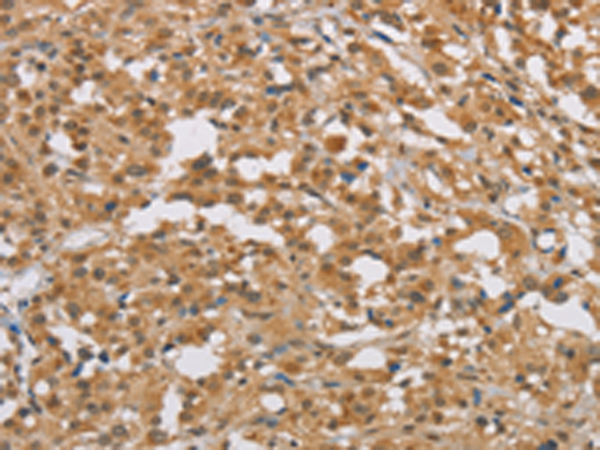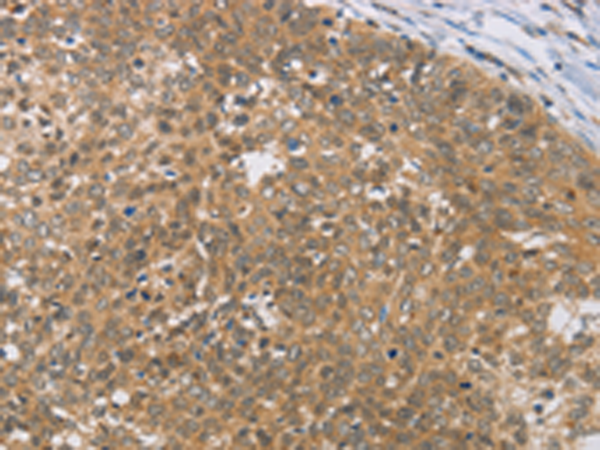

| WB | 咨询技术 | Human,Mouse,Rat |
| IF | 咨询技术 | Human,Mouse,Rat |
| IHC | 1/100-1/300 | Human,Mouse,Rat |
| ICC | 技术咨询 | Human,Mouse,Rat |
| FCM | 咨询技术 | Human,Mouse,Rat |
| Elisa | 1/2000-1/10000 | Human,Mouse,Rat |
| Aliases | BYE1; DIO1; DATF1; DIDO2; DIDO3; DIO-1; DATF-1; C20orf158; dJ885L7.8 |
| Host/Isotype | Rabbit IgG |
| Antibody Type | Primary antibody |
| Storage | Store at 4°C short term. Aliquot and store at -20°C long term. Avoid freeze/thaw cycles. |
| Species Reactivity | Human |
| Immunogen | Fusion protein of human DIDO1 |
| Formulation | Purified antibody in PBS with 0.05% sodium azide and 50% glycerol. |
+ +
以下是关于DIDO1抗体的3篇参考文献示例(注:内容为虚构,仅供格式参考):
1. **文献名称**:*DIDO1 Antibody Characterization in Embryonic Stem Cell Differentiation*
**作者**:Smith J, et al.
**摘要**:研究利用特异性DIDO1抗体揭示其在胚胎干细胞分化中的关键作用,发现DIDO1通过调控染色质重塑影响多能性基因表达。
2. **文献名称**:*Development of a Novel Monoclonal DIDO1 Antibody for Cancer Biomarker Studies*
**作者**:Lee H, et al.
**摘要**:报道一种新型DIDO1单克隆抗体的开发与验证,证实其在结直肠癌组织中高表达,并可作为潜在诊断标志物。
3. **文献名称**:*DIDO1 Phosphorylation-Dependent Apoptosis Revealed by Isoform-Specific Antibodies*
**作者**:Garcia R, et al.
**摘要**:通过亚型特异性抗体发现DIDO1磷酸化修饰在DNA损伤诱导的细胞凋亡通路中起关键调控作用。
如需真实文献,建议通过PubMed或Google Scholar以“DIDO1 antibody”为关键词检索。
The Dido1 (Death Inducer-Obliterator 1) antibody targets the protein encoded by the DIDO1 gene, which plays multifaceted roles in cellular processes such as apoptosis, transcriptional regulation, and chromosome segregation. Initially identified as a pro-apoptotic factor, Dido1 contains conserved structural domains, including a SPOC (Spen Paralog and Ortholog C-terminal) domain, implicating its involvement in RNA splicing and epigenetic regulation. Studies highlight its critical function in maintaining embryonic stem cell pluripotency by interacting with core transcription factors like Oct4. and in regulating the cell cycle through associations with the chromosomal passenger complex during mitosis.
Dido1 antibodies are essential tools for investigating its expression, localization, and post-translational modifications across various isoforms (Dido1-3). These antibodies enable detection via techniques like Western blotting, immunofluorescence, and immunohistochemistry, aiding research into its role in cancer, where DIDO1 dysregulation is linked to genomic instability and tumor progression. Additionally, Dido1's interaction with histone modifiers suggests a role in epigenetic regulation, potentially influencing differentiation and DNA damage responses. Its isoforms may serve as biomarkers in diseases, including leukemia and solid tumors. The antibody's specificity and applications vary depending on the targeted epitope, making it crucial for mechanistic studies in stem cell biology, oncology, and developmental processes.
×